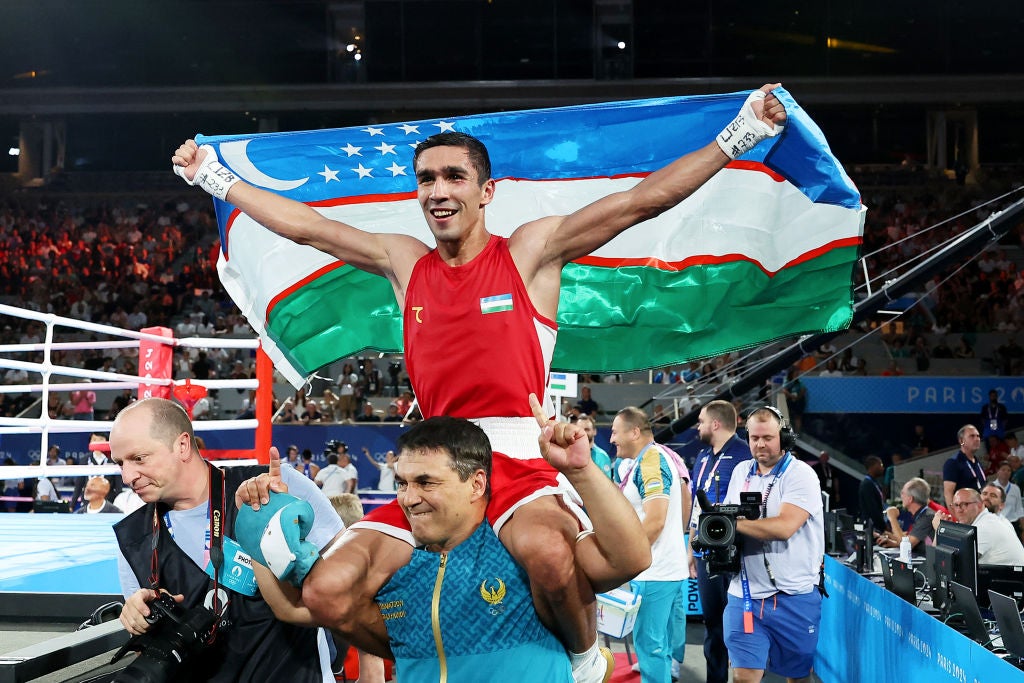Team GB doctors emerge as Olympics heroes after saving life of Uzbekistan boxing coach
Doctor Harj Singh and physio Robbie Lillis treated Tulkin Kilichev after he suffered a cardiac arrest at the Olympic boxing

Your support helps us to tell the story
From reproductive rights to climate change to Big Tech, The Independent is on the ground when the story is developing. Whether it's investigating the financials of Elon Musk's pro-Trump PAC or producing our latest documentary, 'The A Word', which shines a light on the American women fighting for reproductive rights, we know how important it is to parse out the facts from the messaging.
At such a critical moment in US history, we need reporters on the ground. Your donation allows us to keep sending journalists to speak to both sides of the story.
The Independent is trusted by Americans across the entire political spectrum. And unlike many other quality news outlets, we choose not to lock Americans out of our reporting and analysis with paywalls. We believe quality journalism should be available to everyone, paid for by those who can afford it.
Your support makes all the difference.Two members of Team GB’s support staff have emerged as Olympic heroes after helping to save the life of the head coach of the Uzbekistan boxing team.
Tulkin Kilichev was celebrating a gold medal for Uzbek boxer Hasanboy Dusmatov in the warm-up area at Roland Garros on Thursday evening when he suffered a cardiac arrest.
Fortunately for Kilichev, GB Boxing doctor Harj Singh and physio Robbie Lillis were also in the warm-up area and dashed to his aid, with Singh performing CPR and Lillis using a defibrillator.
“The (Uzbek) coaching team came back into the warm-up area and they were all celebrating, and then shouting came from that area that wasn’t celebrations at all,” Lillis said.
“There was a cry for a doctor, for help. Harj was the first person who responded and I followed with the emergency trauma bag that we carry with us.
“When I arrived about 30 seconds after Harj, he had already started performing CPR on the coach. Quite a lot of coaches were pretty visibly distressed around the whole situation, so it took us a moment to clear all of them out of the way.
👏 Real Olympic heroes, Robbie Lillis and Harj Singh!
— Seb Sternik (@seb_sternik) August 10, 2024
Boxing coach Tulkin Kilichev suffered a cardiac arrest on Thursday evening
Team GB's staff immediately came to his aid, with Singh performing CPR and Lillis using a defibrillator pic.twitter.com/Hd81PNmwwu
“I opened up the trauma bag, got the defib out, got the pads on him as quickly as possibly. Once that analysed his heart rhythm, it said a shock was advised so we cleared everybody away and gave him a shock.
“Initially he didn’t come back but, about 20 to 30 seconds later, after Harj continued doing CPR, all of a sudden he came back conscious with us, which was great.”
Singh and Lillis then handed over to the medical team from the venue, who arrived a few minutes later, and Kilichev was taken to hospital, where he is understood to be in a stable condition.
“Hopefully he does make a full recovery,” added Lillis. “Speed is the essence of it. I’m very, very thankful that we did have all the equipment on us, and myself and Harj being there and being trained.
“It’s definitely not my day-to-day job, and I wouldn’t like to make a routine of doing it, but thankfully having had the training I was able to carry that out.”

Team GB medical staff all do regular training at the UK Sports Institute, including a pitch-side trauma course to prepare them for such an eventuality.
Lillis admitted he did not sleep at all on Thursday night following the incident.
“It was obviously a bit of a rush of adrenaline at that time kind of managing the situation,” he said. “I’m obviously grateful to be able to play a part in hopefully helping someone survive.
“My mum said a really nice thing, she said, ‘That’s your Olympic moment’. It’s something obviously I’ll definitely remember, I don’t think I’m going to be forgetting that any time soon.”
Singh has more experience of treating cardiac arrests, although normally in a hospital setting. He is hoping that he and Lillis will be able to visit Kilichev.
“It puts things into perspective,” said Singh. “Everything happened so quickly. At some stage we will endeavour to go to the hospital. If it could be arranged, I think that would be quite emotional for both of us.”